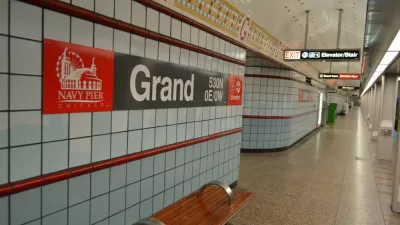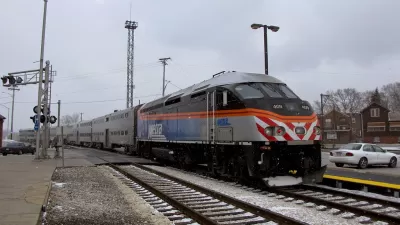The Chicago Transit Authority (CTA) in October proposed a $1.75 billion operating budget that will make it cheaper to ride transit in the Windy City.

The Chicago Transit Authority (CTA) recently proposed a $1.75 billion operating budget "that takes multiple steps to ensure that public transit remains a crucial part of the city’s continuing recovery from the COVID-19 pandemic," according to a press release dated October 21, 2021.
The budget would allow the CTA to maintain all existing bus and transit service while also proposing a "major realignment of fares and passes to better meet changing ridership patterns due to the COVID-19 pandemic," according to the press release.
The press release notes that ridership on CTAA grew throughout 2021 but still falls short of pre-pandemic levels (a pattern that is repeated in other U.S. cities, like New York City, for example). The reduced costs of fares and passes are thus intended to lure back riders who are working on flexible schedules or dealing with the economic shocks of the pandemic.
"CTA is lowering its 30-Day Full Fare pass price to $75 (from $105) and the 30-Day Reduced Fare pass price to $35 (from $50)," according to the press release. "Additionally, the CTA-Pace 7-Day pass will be reduced to $25 (from $33) to reflect the $5 premium for the shared pass with Pace Suburban Bus."
The question of how to lure riders back from catastrophic declines that date back to the earliest days of the pandemic looms over the transit planning community. Ride-hailing companies are facing their own unique problems, potentially creating an opportunity for public transit to win back some of the market share it's lost to companies like Uber and Lyft over the past decade.
An article by Brody Ford provides more details about how the CTA hopes reduced fares will respond to the pandemic's influence on transit in Chicago.

Alabama: Trump Terminates Settlements for Black Communities Harmed By Raw Sewage
Trump deemed the landmark civil rights agreement “illegal DEI and environmental justice policy.”

Planetizen Federal Action Tracker
A weekly monitor of how Trump’s orders and actions are impacting planners and planning in America.

The 120 Year Old Tiny Home Villages That Sheltered San Francisco’s Earthquake Refugees
More than a century ago, San Francisco mobilized to house thousands of residents displaced by the 1906 earthquake. Could their strategy offer a model for the present?

Ken Jennings Launches Transit Web Series
The Jeopardy champ wants you to ride public transit.

BLM To Rescind Public Lands Rule
The change will downgrade conservation, once again putting federal land at risk for mining and other extractive uses.

Indy Neighborhood Group Builds Temporary Multi-Use Path
Community members, aided in part by funding from the city, repurposed a vehicle lane to create a protected bike and pedestrian path for the summer season.
Urban Design for Planners 1: Software Tools
This six-course series explores essential urban design concepts using open source software and equips planners with the tools they need to participate fully in the urban design process.
Planning for Universal Design
Learn the tools for implementing Universal Design in planning regulations.
Clanton & Associates, Inc.
Jessamine County Fiscal Court
Institute for Housing and Urban Development Studies (IHS)
City of Grandview
Harvard GSD Executive Education
Toledo-Lucas County Plan Commissions
Salt Lake City
NYU Wagner Graduate School of Public Service





























